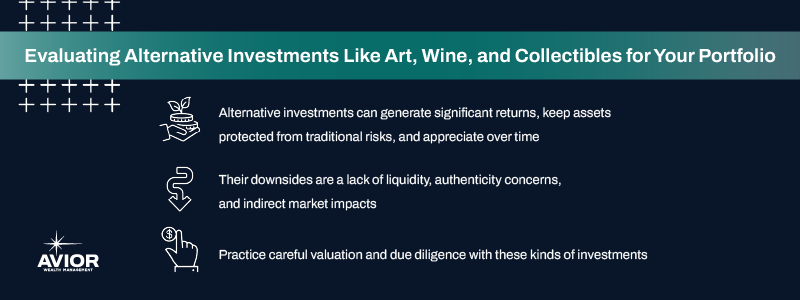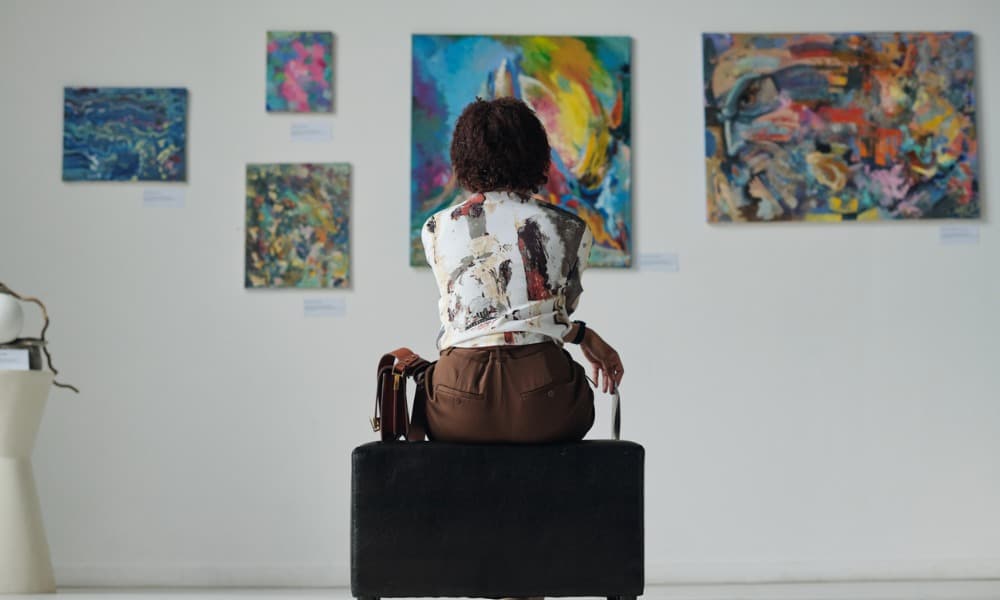Evaluating Alternative Investments Like Art, Wine, and Collectibles for Your Portfolio
Looking into alternative investments, such as art, wine, and other collectibles, can help you diversify.

Investors are increasingly turning to new avenues to diversify their portfolios with new sources of returns. You may not know that alternative investments such as art, wine, collectibles, hedge funds, real estate, and commodities offer very unique opportunities to explore unconventional avenues of wealth protection. Plus, they can be enjoyable to pursue.
Diversifying this way helps you ease the impact of market swings on your money, spreading out risk among different asset classes and potential income sources. This post explores how alternative investments work and why you should consider them.
Why alternative investments are attractive
Alternative investments encompass a wide range of assets beyond conventional stocks, bonds, and mutual funds. They include real estate, hedge funds, private equity, precious metals like gold, and unconventional options like art and wine.
The appeal of alternative investments is their potential to generate returns that don’t necessarily correlate with traditional markets, providing a hedge against market volatility. They also provide the benefit of direct ownership, and certain alternative assets can provide tax perks via long-term capital gains and pass-through depreciation.
While they’re not always seen as investments, valuable art and wine have rich histories and cultural significance, and their values can appreciate over time, making them appealing options for collectors and investors alike.
Challenges of investing in collectibles and alternatives
While alternative investments offer diversification benefits, they also come with their own set of risks. Illiquidity, a lack of income, authenticity issues, and market volatility can pose challenges for investors in nontraditional assets such as art and wine. It’s also hard to understand the complexities of these markets and how they fluctuate with trends.
Here are a few risks to be aware of:
- Illiquidity: With many alternative investments, liquidity is low, meaning you cannot simply access their value when you need additional income. It’s not always easy to find someone to purchase your investments at the price they’re worth.
- Authenticity: The art, wine, and collectible markets can be fraught with counterfeits, and investors may fall prey to making big purchases after being deceived.
- Indirect market impacts: Even while collectibles aren’t directly impacted by the stock market, there are indirect effects. For example, when the stock market crashes, investors’ income may decrease, which leads to fewer purchases and a dip in the collectibles market.
Stay aware of these risks and follow market trends. Prioritizing valuation and due diligence will help you invest in the right places, discussed next.
Valuation and due diligence
Any investment requires due diligence but it’s especially important when venturing into the realm of alternative investments. Assets like collectibles lack standardized metrics for valuation, making the assessment of their worth more complex and subjective.
When evaluating art as an investment, factors such as the artist’s reputation, historical significance, and the overall market trend play crucial roles. Researching an artist’s background and career trajectory and staying informed about market trends are essential steps.
Practicing due diligence with wine investments involves understanding the producer’s reputation and vintage quality. Investors should consider storage conditions and origin to ensure authenticity and value preservation. This also extends to understanding market demand, staying informed about changing consumer preferences, and evaluating the long-term potential for appreciation.
In both art and wine investments, engaging with professionals in the respective industries, such as art appraisers or wine experts, can provide valuable insights. Be prepared to allocate time and resources to staying informed about market inclinations and assessing ongoing performance.
Risk management considerations
Successful investment strategies involve a well-diversified portfolio that includes a mix of traditional and alternative assets. The key is to strike a balance that aligns with your risk tolerance, investment goals, and timeline. Allocating a portion of your portfolio to alternative investments can enhance diversification and potentially improve overall risk-adjusted returns.
Assess your liquidity needs and ensure that you allocate an amount to assets that won’t compromise your ability to meet short-term financial requirements. Monitor the performance of your alternative investments regularly. Stay informed and monitor for changes in your chosen sectors, including any factors that may impact value.
Also, be mindful of the tax implications associated with alternative investments. While you may get some benefits through these types of assets, remember to balance when you sell or receive income with your other revenue streams.
Many alternative investments, such as certain types of real estate, may not yield immediate returns. Be patient and adopt a long-term perspective, understanding that the value of these assets may appreciate over time.
Diversifying your investment portfolio with Avior
As you’re navigating investments and selecting the right options for your portfolio, consider how alternatives have become attractive options. Art, wine, precious metals, and other nontraditional assets offer unique opportunities for diversification and potential returns.
Remember that it is still essential to approach these opportunities with diligence, conducting thorough research and understanding the specific risks associated with each investment.
Align alternative assets with your overall wealth management goals and investment strategy. We can help you create the right portfolio at Avior.
Talk to us today to get started with investment management solutions.
Disclaimer: Nothing contained herein should be construed as legal or tax advice. Avior and our Advisors will work with your attorney and/or tax professional to assist with your legal and tax strategies. Please consult your attorney or tax professional with specific legal and/or tax questions. Investment Management and Financial Planner are offered through Avior Wealth Management, LLC, an SEC-registered investment advisor. Past performance is not a guarantee of future results. Investments are subject to loss, including the loss of principal.
No Comments
Sorry, the comment form is closed at this time.




